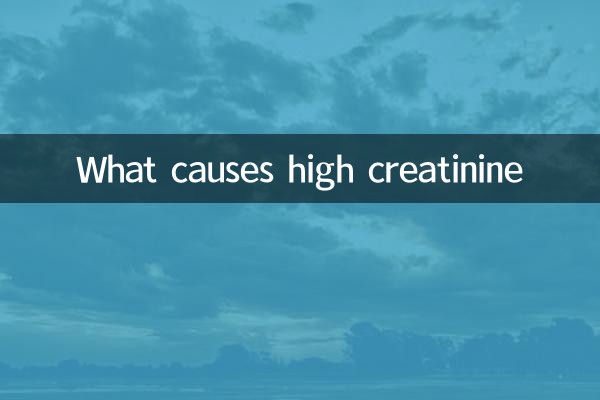What causes high creatinine? ——Analysis of common factors causing elevated creatinine
Creatinine is a product of muscle metabolism and is mainly excreted through the kidneys. Elevated creatinine levels in the blood usually indicate impaired kidney function, but may be related to other factors. This article will combine the hot health topics of the past 10 days, conduct a structured analysis of the common causes of high creatinine, and provide relevant data references.
1. The main reasons for high creatinine

| Cause classification | specific factors | Influence mechanism |
|---|---|---|
| kidney disease | acute kidney injury, chronic kidney disease | Decreased glomerular filtration rate and decreased creatinine excretion |
| drug factors | Antibiotics, NSAIDs, chemotherapy drugs | Drug nephrotoxicity directly damages the nephron |
| physiological factors | Vigorous exercise, high-protein diet | Increased creatinine production over a short period of time |
| Other diseases | Diabetes, high blood pressure, dehydration | Long-term effects on renal microvascular structure |
2. Analysis of recent hotspot correlations
According to popular discussions in the health field in the past 10 days, the following topics are closely related to elevated creatinine:
| hot topics | Relevance | typical crowd |
|---|---|---|
| Internet celebrity weight loss method | High-protein diet causes creatinine fluctuations | Women aged 18-35 |
| exercise-induced rhabdomyolysis | Creatinine spikes after extreme exercise | fitness enthusiast |
| Controversy over nephrotoxicity of traditional Chinese medicine | Risks of preparations containing aristolochic acid | Middle-aged and elderly patients with chronic diseases |
3. Data-based interpretation of creatinine standards
| crowd | Normal range (μmol/L) | critical value | Hazard value |
|---|---|---|---|
| adult male | 53-106 | 107-132 | >133 |
| adult women | 44-97 | 98-115 | >116 |
| child | 27-62 | 63-75 | >76 |
4. Warning symptoms of elevated creatinine
When the following situations occur, it is recommended to check kidney function in time:
• Persistent fatigue that is not relieved by rest
• Significant decrease in urine output or increase in nocturia
• Eyelid edema or lower limb swelling in the morning
• Loss of appetite with nausea and vomiting
• Itchy skin without clear rash
5. Prevention and response measures
1.Diet modification:Control daily protein intake between 0.8-1g/kg of body weight and avoid consuming large amounts of protein powder in the short term
2.Scientific medication:People who take NSAIDs for a long time should monitor their kidney function every 3 months
3.Sports Management:Avoid sudden strenuous exercise and replenish electrolytes promptly after exercise
4.Basic disease control:Diabetic patients should control glycated hemoglobin below 7%
Recent data from the Department of Nephrology of a tertiary hospital showed that among patients with elevated creatinine, approximately 42% were related to inappropriate medication, 28% were due to poor control of chronic diseases, and 19% were due to extreme weight loss or exercise. Experts specifically remind that if the creatinine value suddenly increases by more than 50%, you need to seek medical attention immediately.
It should be noted that there are individual differences in creatinine levels, and the basic value may be higher in people with larger muscle mass. It is recommended to establish a personal health file and regularly track the changing trends of test data instead of focusing solely on a certain test value.

check the details

check the details